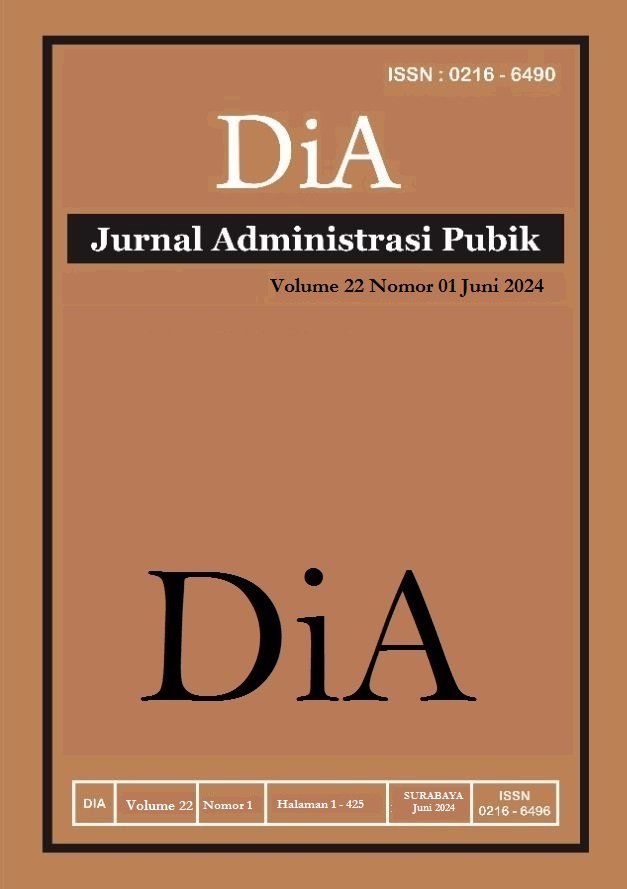IMPLEMENTATION OF THE SIREKAP PROGRAM IN PILKADA 2020 AT KPU SUKABUMI DISTRICT
DOI:
https://doi.org/10.30996/dia.v22i01.8722Keywords:
Implementation, SIREKAP, KPU Sukabumi DistrictAbstract
Indonesia is a democratic country where the supreme power is in the hands of the people. Therefore, the people of Indonesia have the right to choose who will become the people's representatives. In order to provide facilities and a place to improve the quality of service for the direct election of leaders and representatives of the people, the KPU provides a new innovation, namely by making or creating a Mobile Vote Recapitulation Information System (SIREKAP) programme. This research aims to find out how the implementation of SIREKAP is carried out in practice by the Sukabumi Regency KPU. This research uses the theory of Chales O. Jones (1996) which has 4 dimensions, namely Organisation, Interpretation, and Implementation. The research method used in this research is Qualitative Narrative. The results of this study indicate that the implementation of SIREKAP when viewed from the dimensions, organisation, interpretation and implementation according to Charles O. Jones (1996) is still not well implemented because it has not fulfilled 3 dimensions which in terms of Organisation has not fulfilled the suitability of resources, Interpretation is still not a lack of information, socialisation, and communication received by the public regarding the SIREKAP application and the application itself is constrained by high traffic which causes the failure of sending C1 plenary results.
Downloads
References
Agustino, L. (2016). Dasar-dasar Kebijakan Publik (Edisi Revisi). Alfabeta.
Anderson, J. E. (2003). Public Policy Making : An Introduction. Boston Houghton Miffin Company, 1–34.
Anggara, S. (2014). Kebijakan Publik. CV Pustaka Setia.
Asterix, E., Mardiyanta, A., & Setijaningrum, E. (2021). Overcoming Slum Settlements: Lesson Learned From Implementation Of Uninhabitable House Social Rehabilitation Program In Surabaya. DIA: Jurnal Administrasi Publik, 19(1), 1 - 28. https://doi.org/10.30996/dia.v19i1.4619
Cairney, P. (2013). Understanding public policy: Theories and issues. Red Glode Press.
Chaverlin, H., Liando, D. M., & Tulung, T. E. (2022). Implementasi Aplikasi SIREKAP Pada Pilkada Kota Manado Tahun 2020. Jurnal Governance, 2(1).
Creswell, C. J. (2017). Research Design Edisi 3 Terjemahan Achmad Fawaid. Pustaka Belajar.
Creswell, J. (2019). RESEARCH DESIGN Qualitative, Quantitative and Mixed Methods Approach Fourth Edition. Student Library.
Chaverlin, H., Liando, D. M., & Tulung, T. E. (2022). Implementasi Aplikasi
SIREKAP Pada Pilkada Kota Manado Tahun 2020 . Jurnal Governance, 2(1).
Edward III, G. (2003). Implementasi Kebijakan Publik; Transformasi Pemikiran George Edwards. Terjemahan oleh Hessel Nogos Tangklisan. Lukman Offset.
Forman, M. (2005). Using IT to Transform the Effectiveness and Efficiency of Government. Ournal E-Government and Information Technology., 27.
Gauru, C. C., Martini, R., & Alfirdaus, L. K. (2022). IMPLEMENTASI SIREKAP DALAM PILKADA 2020 KABUPATEN SEMARANG. REFORMASI Jurnal Ilmiah Ilmu Sosial Dan Ilmu Politi, 12(2).
Hadyatama. (2022). Efektivitas Penggunaan Aplikasi SIREKAP Dalam Pengiriman Hasil Perhitungan Suara Pelaksanaan Pilkada Tahun 2020 Pada Pemilihan Gubernur Dan Wakil Gubernur Provinsi Sumatera Barat . Journal of Policy, Governance, Development and Empowerment, 2(3), 275–281.
Indiahono, D. (2009). Perbandingan Administrasi Publik (Public Policy). Gravamedia.
Indrajit, R. E. (2016). Electronic Government: Strategi Pembangunan dan Pengembangan Sistem Pelayanan Publik Berbasis Teknologi Digital. Andi.
Jones, C. O. (1996). Pengantar Kebijakan Publik (Public Policy) Terjemahan Ricky Ismanto. PT Raja Grafin.
Keban, Y. T. (2008). Enam Dimensi Strategis Administrasi Publik : Konsep, Teori, Dan Isu. Gravamedia.
Mazmanian, Daniel. H., & Sabatier, P. A. (1983). Implementation and Public Policy. Harper Collins.
Milatina, 2021. PEMILU YANG BERSIH MELAHIRKAN PEMIMPIN YANG JUJUR DAN ADIL. Site from htTPS://pekalongankab.bawaslu.go.id/berita/detail/pemilu-yang-bersih-melahirkan-pemimpin-yang-jujur-dan-adil#:~:text=%E2%80%9D%20Pemilu%20adalah%20sarana%20bagi%20rakyat,hak%2Dhak%20warga%20negara%20Indonesia
Nugroho, R. (2021). Kebijakan Publik: Implementasi dan Pengendalian Kebijakan. PT Elex Media Computindo.
Pasal 22E ayat (5) UUD NRI TAHUN 1945
Pasolong, H. (2010). Teori Administrasi Publik. Alfabeta.
PKPURI No19 Tahun 2020 tentang perubahan atas PKPI No8 Tahun 2018 tentang pemungutan dan penghitungan suara pemilihan Gubernur dan Wakil Gubernur, Bupati dan Wakil Bupati,dan/atau Walikota dan Wakil Walikota
Purwanto, A., & Sulistyastuti, D. (2012).implementasi Kebijakan Publik. Konsep dan Aplikasinya di Indonesia. Gravamedia.
Rahayu, A. Y. S. S. dan V. J. (2019). Birokrasi & Governance Teori, Konsep dan Aplikasinya. PT Rajagrafindo Persada
Rizaty, Monavia Ayu. 2022. BPS: Jumlah Penduduk Indonesia Sebanyak 275,77 Juta pada 2022. htTPS://dataindonesia.id/varia/detail/bps-jumlah-penduduk-indonesia-sebanyak-27577-juta-pada-2022
Sinambela, L. P. (2011). Reformasi Pelayanan Publik. Bumi Aksara.
Sugiyono. (2018). Metode Penelitian Kuantitatif, Kualitatif, dan R&D. Alfabeta.
Suharto, E. (2014). Analisis Kebijakan Publik. CV. Alfabeta.
Tachjan. (2006). Implementasi Kebijakan Publik. AIPI.
Tahir, A. (2015). Kebijakan Publik & Transparasi Penyelenggaraan Pemerintah Daerah. Alfabeta.
Telegram grup operator SIREKAP 2020
Undang-Undang Nomor 22 Tahun 2007 Tentang Penyelenggara Pemilu
UU Pilkada pasal 111 ayat 1 2020
Van Meter, D., & Van Horn, C. (1975). Model-model dalam Kebijakan
Implementasi.
Wahab, S. (2012). ANALISIS KEBIJAKAN: Dari Formulasi ke penyusunan Model-Model Implementasi Kebijakan Publik. PT. Bumi Aksara.
Downloads
Published
How to Cite
Issue
Section
License
The DiA journal allows authors to retain the copyright of their papers without limitation. Authors may grant publishers non-exclusive publishing rights to publish articles. Granting first publishing rights to publishers also qualifies as unlimited copyright (because there are no restrictions imposed by publishers on author copyright).







